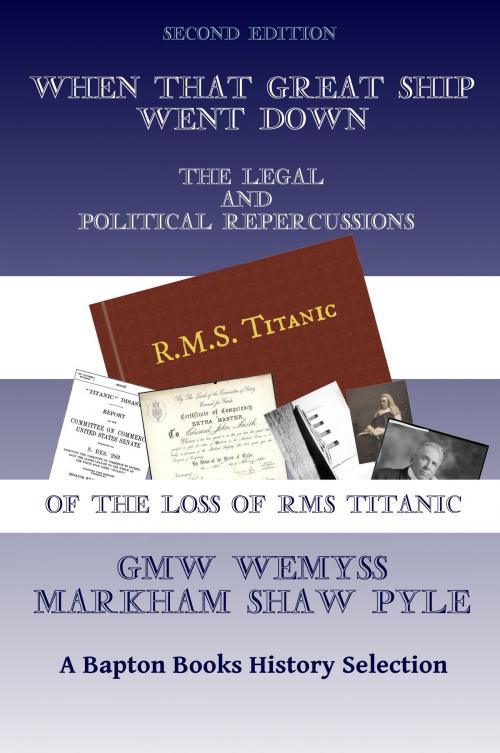When That Great Ship Went Down: The Legal and Political Repercussions of the Loss of RMS Titanic
Nonfiction, Social & Cultural Studies, Political Science, Politics, History & Theory, History, Modern, 20th Century| Author: | Markham Pyle | ISBN: | 9781301068197 |
| Publisher: | Bapton Books | Publication: | January 16, 2013 |
| Imprint: | Smashwords Edition | Language: | English |
| Author: | Markham Pyle |
| ISBN: | 9781301068197 |
| Publisher: | Bapton Books |
| Publication: | January 16, 2013 |
| Imprint: | Smashwords Edition |
| Language: | English |
RMS Titanic sank in 1912, a US presidential election year; and in the very first days of the great House of Commons debate on Home Rule for Ireland. The Marconi companies were heroes to the press and the public, who credited them with saving the lives that were saved; JP Morgan, who owned the shipping trust that controlled Titanic's White Star Line, was a major political target for the trust-busters. And members of the British Cabinet, including the Attorney-General who was to direct (and nobble) the Crown's case in the Titanic enquiry, were up to their necks in inside trading in Marconi shares.
This is the story of how, in Titanic's loss, 1500 souls were sacrificed to the 'settled science' and 'scientific consensus' of marine engineering. It is also the story of how the US and British loss enquiries were shaped by party politics, corrupted by corrupt politicians and the Marconi Scandal, tainted by the politics of Irish Home Rule, and - finally - salvaged by Oliver Wendell Holmes and the US Supreme Court, and by Lord Mersey's judgement in the Board of Trade Enquiry and the subsequent International Convention for the Safety of Life at Sea. This is the story of the witch-hunts, the cover-ups, and two upright judges who fought against the crooked deals they did not know were being done.
Titanic sank a century ago; but she sails on, the ghost ship of modern law and politics, shaping our world in ways we don't notice.
This is that story, told by the historians of Churchill's vindication in May 1940 and of how Congress, four months before Pearl Harbor, kept America's armed services ready for war, by a margin of one vote.
Praise for When That Great Ship Went Down:
'What sank the Titanic? Its builders' belief that, when it came to building ships, "the Science Was Settled". And, as this cool reassessment of the US and British Titanic enquiries shows, politicians and regulators in 1912 were just as bad as the current lot: they had a progressive political narrative to push, and their own secrets to hide. Sounds familiar.'
- James Delingpole, Daily Telegraph columnist, 2010 winner of the Bastiat Prize for Online Journalism, and author of, most recently, Watermelons: The Green Movement's True Colours
'In this sharply and eruditely-drawn account of the Titanic Inquiries on either side of the Atlantic, the authors warn: "What lessons this may hold for Mr Cameron and Mr Salmond is beyond the scope of this work." Fortunately, their vivid reconstruction and analysis enable us to draw plenty of damning parallels. This is a parliamentary procedural as well as the re-creation of a vanished pre-War world; its political and intellectual processes as well as a sociology ranging from Trollope to Joyce. This is far more than another clever "Titanic" book.'
- Anne-Elisabeth Moutet, Paris Contributing Columnist, The Sunday Telegraph
RMS Titanic sank in 1912, a US presidential election year; and in the very first days of the great House of Commons debate on Home Rule for Ireland. The Marconi companies were heroes to the press and the public, who credited them with saving the lives that were saved; JP Morgan, who owned the shipping trust that controlled Titanic's White Star Line, was a major political target for the trust-busters. And members of the British Cabinet, including the Attorney-General who was to direct (and nobble) the Crown's case in the Titanic enquiry, were up to their necks in inside trading in Marconi shares.
This is the story of how, in Titanic's loss, 1500 souls were sacrificed to the 'settled science' and 'scientific consensus' of marine engineering. It is also the story of how the US and British loss enquiries were shaped by party politics, corrupted by corrupt politicians and the Marconi Scandal, tainted by the politics of Irish Home Rule, and - finally - salvaged by Oliver Wendell Holmes and the US Supreme Court, and by Lord Mersey's judgement in the Board of Trade Enquiry and the subsequent International Convention for the Safety of Life at Sea. This is the story of the witch-hunts, the cover-ups, and two upright judges who fought against the crooked deals they did not know were being done.
Titanic sank a century ago; but she sails on, the ghost ship of modern law and politics, shaping our world in ways we don't notice.
This is that story, told by the historians of Churchill's vindication in May 1940 and of how Congress, four months before Pearl Harbor, kept America's armed services ready for war, by a margin of one vote.
Praise for When That Great Ship Went Down:
'What sank the Titanic? Its builders' belief that, when it came to building ships, "the Science Was Settled". And, as this cool reassessment of the US and British Titanic enquiries shows, politicians and regulators in 1912 were just as bad as the current lot: they had a progressive political narrative to push, and their own secrets to hide. Sounds familiar.'
- James Delingpole, Daily Telegraph columnist, 2010 winner of the Bastiat Prize for Online Journalism, and author of, most recently, Watermelons: The Green Movement's True Colours
'In this sharply and eruditely-drawn account of the Titanic Inquiries on either side of the Atlantic, the authors warn: "What lessons this may hold for Mr Cameron and Mr Salmond is beyond the scope of this work." Fortunately, their vivid reconstruction and analysis enable us to draw plenty of damning parallels. This is a parliamentary procedural as well as the re-creation of a vanished pre-War world; its political and intellectual processes as well as a sociology ranging from Trollope to Joyce. This is far more than another clever "Titanic" book.'
- Anne-Elisabeth Moutet, Paris Contributing Columnist, The Sunday Telegraph















